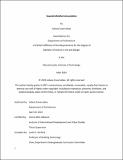| dc.contributor.advisor | Abbanat, Cherie Miot | |
| dc.contributor.author | Covarrubias, Juliana | |
| dc.date.accessioned | 2024-10-16T17:46:47Z | |
| dc.date.available | 2024-10-16T17:46:47Z | |
| dc.date.issued | 2024-05 | |
| dc.date.submitted | 2024-10-10T15:16:57.620Z | |
| dc.identifier.uri | https://hdl.handle.net/1721.1/157364 | |
| dc.description.abstract | Humanity is using up more of the Earth's resources than the planet can replenish each year. The unsustainable rate at which humanity is depleting the Earth's resources threatens the viability of our current lifestyles, posing significant challenges for future generations. Further, it places a heavy burden on the planet, resulting in several environmental problems, most notably climate change. Many approaches to combating climate change focus on lessening the impact of our current living habits on the Earth. Popular initiatives involving biodegradability, recycling, and carbon offsetting seek to reduce the effects of pollution while allowing humanity to keep consuming products at the same rate. Alternatively, reducing the production of these goods in the first place eliminates the need for such anti-pollution interventions downstream. This thesis considers climate change at one of its sources: overconsumption. The thesis examines the history of consumer culture to identify the causes of our current excessive consumption patterns. Through analyzing the influences that advertising and culture have on our behavior, this thesis aims to demystify and uncover the power we have over our actions as consumers. The final output of this thesis is a handwritten book of thoughts and sketches that is distributed around the public sphere to provoke conversations about our individual relationships with consumerism. These discussions may have broader implications as they spread and lead to behavioral shifts towards more mindfully consumerist lifestyles. Ultimately, this thesis uses a dialogue with itself to plant a seed challenging the status quo of overconsumption, catalyzing meaningful discussion about our responsibilities, behaviors, and concerns in a consumption-driven world. | |
| dc.publisher | Massachusetts Institute of Technology | |
| dc.rights | In Copyright - Educational Use Permitted | |
| dc.rights | Copyright retained by author(s) | |
| dc.rights.uri | https://rightsstatements.org/page/InC-EDU/1.0/ | |
| dc.title | Towards Mindful Consumption | |
| dc.type | Thesis | |
| dc.description.degree | S.B. | |
| dc.contributor.department | Massachusetts Institute of Technology. Department of Architecture | |
| mit.thesis.degree | Bachelor | |
| thesis.degree.name | Bachelor of Science in Art and Design | |
